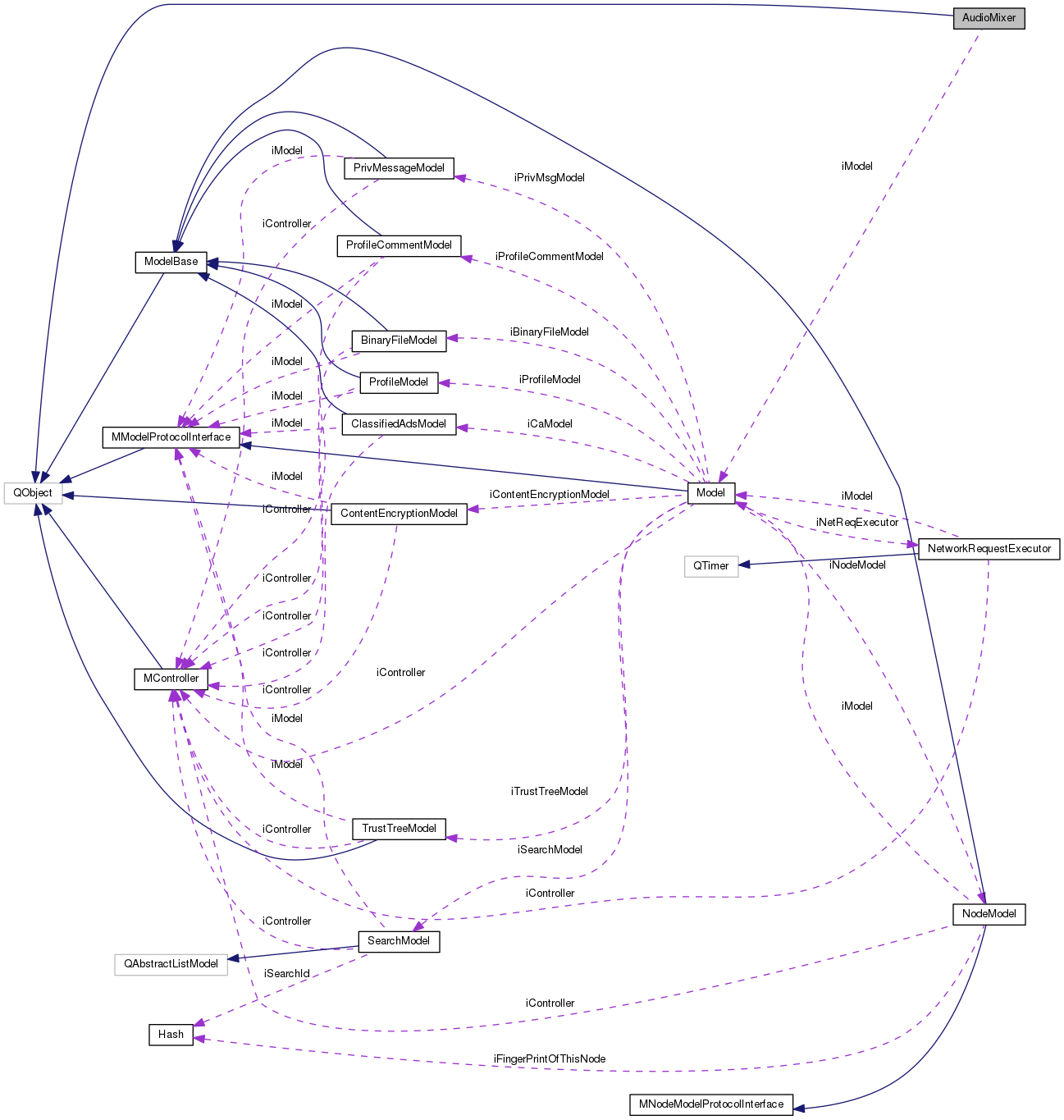Class for mixing together 0-n audio streams. More...
#include <audiomixer.h>


Classes | |
| struct | AudioFrameStruct |
| struct | AudioStreamMetadata |
Public Slots | |
| void | insertCapturedAudioFrame (const QByteArray &aFrame, quint32 aSeqNo) |
| void | insertReceivedAudioFrame (quint32 aCallId, quint32 aSeqNo, const QByteArray &aFrame) |
Signals | |
| void | frameReadyForLocalSpeaker (const QByteArray &aFrame) |
| void | frameReadyForRemoteSend (quint32 aCallId, quint32 aSeqNo, const QByteArray &aFrame) |
Public Member Functions | |
| AudioMixer (Model &aModel) | |
| ~AudioMixer () | |
| void | insertStream (quint32 aCallId, quint32 aStartingSeq, bool aIsLocallyCaptured) |
| void | removeStream (quint32 aCallId) |
Private Types | |
| typedef struct AudioMixer::AudioFrameStruct | AudioFrame |
| typedef struct AudioMixer::AudioStreamMetadata | AudioFrameMetadata |
Private Member Functions | |
| void | tryMixFrames (quint32 aCallId, quint32 aSeqNo) |
| void | configureMixedStreams () |
| void | doInsertAudioFrame (const QByteArray &aFrame, bool aIsLocallyCaptured, quint32 aSeqNo, quint32 aCallId) |
| void | clip (QByteArray &aBuffer) |
Private Attributes | |
| QList< QQueue< AudioFrame > > | iAudioDataBuffer |
| QList< AudioFrameMetadata > | iStreams |
| QList< int > | iIndexesToMixForLocalSpeaker |
| QList< int > | iIndexesToMixForRemoteOutput |
| Model & | iModel |
Detailed Description
Class for mixing together 0-n audio streams.
This class has 2 types of input and 2 types of output. Input type 1: locally captured microphone data Input type 2: 0-n streams sent from remote nodes Output type 1: Audio intended for playback from local loudspeaker Output type 2: Audio intended to be sent to remote nodes Depending on situation this class will mix a bit differently. If there is only type 1 input and 1 type 2 stream then no mixing will occur: input type 2 becomes output type 1 and that's it. If there is more than 1 streams to mix together then mixer will actually mix.
Member Typedef Documentation
|
private |
|
private |
Constructor & Destructor Documentation
| AudioMixer::AudioMixer | ( | Model & | aModel | ) |
Constructor.
| AudioMixer::~AudioMixer | ( | ) |
Member Function Documentation
|
private |
Method that clips away samples that do not fall into [-1,1] range
|
private |
method for figuring out which stream to mix into which direction
|
private |
workhorse of insertCaptured/ReceivedAudioFrame slots
- Parameters
-
aIsLocallyCaptured is true if audio is from local microphone and false if received from remote node
|
signal |
emitted when mixing done for local playback
|
signal |
emitted when mixing done for remote nodes
|
slot |
Method for inputting an audio frame from local microphone. Frame is 60 milliseconds raw audio data in floating point format with 8kHz sample rate. That means there are 480 samples, totalling 960*2 bytes. See constants in top of audiomixer.cpp file. Each floating point sample in array needs to be in range [-1,1]
- Parameters
-
aFrame is the audio data. floating point, native-encoding audio/pcm data. aSeqNo Sequence number of frame. This is a incrementing number that begins from 0 at stream start. Note that it is entirely possible to start mixing a stream from middle so when processing starts, this value does not necessarily start from 0
|
slot |
Method for inputting an audio frame that is received from network. See method insertCapturedAudioFrame for more information, same frame data format must be used.
- Parameters
-
aFrame is the audio data. float, native-encoding audio/pcm data. aSeqNo Sequence number of frame. This is a incrementing number that begins from 0 at stream start. Note that it is entirely possible to start mixing a stream from middle so when processing starts, this value does not necessarily start from 0 aCallId Call id for keeping track which frame belongs to which stream. Typically inside mixer there are both locally captured frames and frames from remote that both have same call id ; if there are multiple calls in progress then one set of frames of local input and several from remote sources. If aIsLocallyCaptured is true, then value of this parameter has no effect
| void AudioMixer::insertStream | ( | quint32 | aCallId, |
| quint32 | aStartingSeq, | ||
| bool | aIsLocallyCaptured | ||
| ) |
method for entering stream metadata so that stream with given callid gets included into mixer output
| void AudioMixer::removeStream | ( | quint32 | aCallId | ) |
method for removing stream metadata so that stream with given callid no longer gets included into mixer output
|
private |
workhorse method. will check for buffers and see if we have frames for all streams to mix and if conditions evaluate true, will output the mixed frame, or several if possible.
Member Data Documentation
|
private |
Voice data buffer. Must share same indexing with iStreams e.g. if stream metadata for call x is in iStreams[y] then call data for that stream needs to go to queue strictly at iAudioDataBuffer[y]
|
private |
List of indexes to iStreams that are mixed into speaker output
|
private |
List of indexes to iStreams that are mixed into remote nodes
|
private |
datamodel
|
private |
Metadata of streams being served
The documentation for this class was generated from the following file:
- /tmp/classified-ads/classified_ads/call/audiomixer.h
 1.8.11
1.8.11